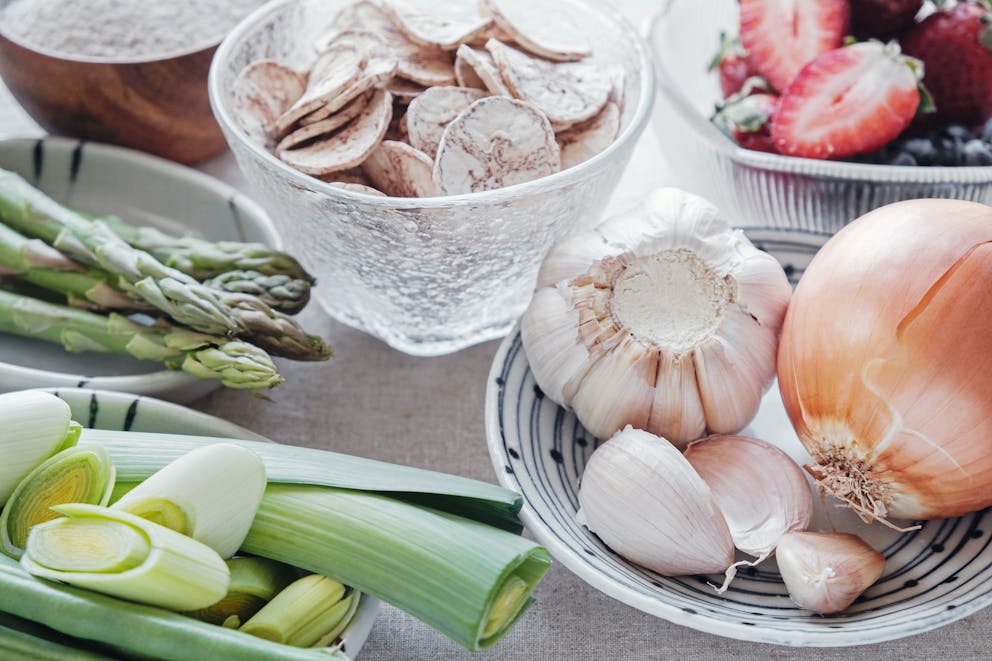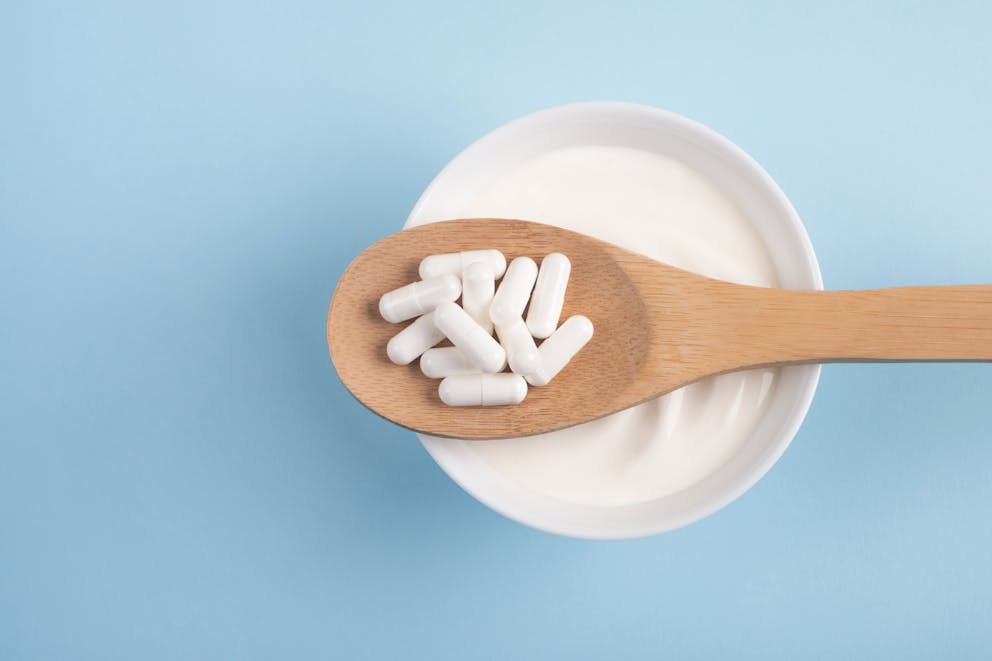Prebiotics vs. Probiotics: What’s the Difference?
Prebiotics vs. Probiotics - Difference Between Prebiotics and Probiotics
Most people are not aware of the difference between prebiotics and probiotics.
Learn why it's important to regularly consume prebiotic and probiotic-rich foods and discover the best sources to incorporate.
What are probiotics?
The term probiotic means "for life," which reflects the importance of these beneficial microorganisms for human health and well-being.
Probiotics naturally reside in the digestive system and form the intestinal microflora, a symbiotic community of live bacteria, yeasts, and viruses. In order to be classified as a probiotic, a microbe must be a part of the human microbiome, linked to health benefits, and safe for consumption.
Probiotics are crucial for optimal digestive health, immune system functions, nutrient absorption, metabolic health, and detoxification. In addition, beneficial gut microbes compete with pathogenic microorganisms for space and nutrients, which helps prevent the overgrowth of potentially harmful bacteria and yeasts.
An imbalanced microflora can manifest in a wide range of symptoms, such as:
Poor digestive health
Irritable bowel syndrome
Food allergies
Unexplained weight gain
Mood disorders
Fatigue
Skin conditions, including eczema, psoriasis, and dermatitis

Sources of probiotics
Fermentation creates an ideal environment for good bacteria to thrive and flourish, which explains why fermented foods are the best sources of probiotics.
Regularly consuming probiotic-rich foods such as sauerkraut, kimchi, miso, tempeh, kefir, and yogurt helps increase beneficial bacteria in the gut and promotes a diverse intestinal microflora.
A study published in Cell found that individuals who increased their intake of probiotic-rich foods for ten weeks had an increased microbial diversity, fewer gut issues, and an overall improvement in general health.
“Antibiotics, stress, alcohol, processed foods, and a high sugar diet can alter the composition of gut microbes,” explains Dr. Berg. “Unfortunately, many people don’t consume enough probiotic-rich foods to maintain optimal concentrations of helpful bacteria in the gut.”
Taking probiotic supplements containing different strains of Lactobacillus and Bifidobacteria can help increase gut bacteria diversity and has been found to improve digestive health.
What are prebiotics?
Prebiotics are non-digestible fibers in certain foods that promote the activity and growth of beneficial gut bacteria.
Certain intestinal microbes ferment prebiotic fibers into short-chain fatty acids (SCFAs), which are the primary fuel source for the beneficial bacteria residing in your gut.
SCFAs provide nourishment for probiotics and maintain a slightly acidic environment in the large intestine, which helps prevent the growth of potentially harmful bacteria and creates an ideal environment for beneficial microbes to thrive.
Sources of prebiotics
Regularly consuming prebiotic foods helps maintain a healthy and balanced gut microbiota.
Here are some of the best prebiotic-rich foods:
Garlic
Leek
Onion
Asparagus
Artichoke
Chicory root
According to research published in The Journal of Nutrition, most U.S. adults don’t consume adequate amounts of prebiotic fiber, leaving them at risk of an imbalanced microflora.
The same study suggests that taking supplements containing prebiotic fibers can help compensate for low dietary fiber intake and contribute to a balanced and thriving gut microbiota.

Prebiotic vs. probiotic
Probiotics and prebiotics are equally important and work in unison to promote a balanced gut microbiome.
While probiotics introduce beneficial live microorganisms into the digestive tract, prebiotics provide the necessary nutrients to support the growth and activity of these probiotics.
According to evidence published in The Journal of Nutrition, consuming prebiotics and probiotics as part of a healthy diet enhances digestive and immune functions and may lower the risk of health conditions such as inflammatory bowel disease (IBD) and Crohn's disease.

Benefits of taking prebiotics and probiotics together
Because of the synergistic interplay of prebiotics and probiotics, increasingly more symbiotic supplements are available.
Symbiotic supplements combine beneficial live bacteria with prebiotic fibers, which increases the survival of probiotics traveling through the digestive tract, enhances the production of SCFAs, and promotes microbial diversity.
Evidence published in SciElo confirms the health benefits of taking prebiotics and probiotics together and concludes, “The use of symbiotics balances a healthy intestinal flora which aids in reducing constipation or diarrhea, improves intestinal permeability, and stimulates the immune system.”
Here are four benefits of taking prebiotics and probiotics together.
1. Promotes digestive health
Adding symbiotic supplements to your routine can improve gut health and speed up digestion.
Certain probiotic strains, such as Lactobacillus acidophilus and Bifidobacterium, can produce enzymes that help digest carbohydrates, proteins, and fats.
Combining probiotics with prebiotics can increase SCFA concentrations linked to a slightly acidic pH in the digestive tract. This helps activate digestive enzymes, promotes nutrient absorption, and enhances overall digestive health.
In addition, SCFAs have potent anti-inflammatory properties, which explains why taking probiotics in combination with prebiotic fibers can help prevent or manage inflammatory health conditions, including IBD, psoriasis, and rheumatoid arthritis.

2. Strengthens immune function
Your immune system is mostly gut bacteria, and combining prebiotics and probiotics can positively impact immune function.
Gut microbes interact with your immune system and regulate the production and activity of immune cells. A healthy microflora promotes balanced immune responses, which protect the body from harmful microbes and diseases without causing excessive inflammation or tissue damage.
3. Supports mental well-being
Probiotics have been found beneficial for the central nervous system, and symbiotics may offer a natural way to support mental health.
Research published in Behavioral Brain Research found that people with an imbalanced microflora have a significantly greater risk of depression than those with a healthy microbiome.
It’s believed that SCFAs stimulate the release of brain-derived neurotrophic factor (BDNF). BDNF plays a profound role in brain function and neuronal health and is associated with a lower risk of depression and anxiety.
4. Supports metabolic health
Both probiotics and prebiotics promote metabolic health, and combining them can augment their benefits for blood sugar regulation, weight management, and energy-making processes.
SCFAs stimulate the production of glucagon-like peptide 1 (GLP-1), a critical metabolic hormone that regulates insulin levels and blood sugar balance.
Balanced insulin production promotes healthy blood sugar levels, which reduces the risk of weight gain and metabolic imbalances such as insulin resistance and type 2 diabetes.

Key takeaways
Prebiotic vs. probiotic—what’s the difference?
While probiotics are live microorganisms with various health benefits, prebiotic fibers help beneficial gut bacteria to thrive and flourish.
Taking prebiotics and probiotics helps restore and maintain a diverse intestinal microflora, which is linked to digestive health, strong immune system functions, metabolic balance, and mental well-being.
FAQ
1. What are prebiotics?
Prebiotics are non-digestible fibers that serve as a fuel source for beneficial gut bacteria. Prebiotic fibers promote microbial diversity and help prevent the growth of potentially harmful microbes.
Foods including onion, garlic, asparagus, artichoke, dandelion greens, and leeks are excellent sources of prebiotic fibers.
2. What are probiotics?
Probiotics are live microorganisms, including bacteria and yeasts, that naturally reside in the gut and promote a diverse intestinal microflora, which is linked to various health benefits.
Fermented foods such as sauerkraut, kimchi, tempeh, miso, and yogurt are rich sources of probiotics.
3. Probiotic vs. prebiotic: what’s the difference?
While probiotics are live microorganisms that confer health benefits when consumed, prebiotics are non-digestible fibers that promote the growth and activity of beneficial gut bacteria.
4. What are the benefits of prebiotics?
Prebiotics promote the growth of beneficial gut microbes, which contributes to a balanced and healthy microbiome.
Certain gut bacteria convert prebiotic fibers into short-chain fatty acids (SCFAs), which provide energy for beneficial microbes, promote digestive processes, enhance nutrient absorption, and support balanced blood sugar levels.
5. Is it better to take a prebiotic or probiotic?
It’s recommended to take a symbiotic supplement that contains both prebiotics and probiotics.
Probiotics help increase beneficial gut bacteria, and prebiotics enhance the health benefits of probiotics by supporting a healthy gut environment that allows healthy microbes to grow and flourish.
6. What are the signs you need prebiotics?
Signs that you may need prebiotics include digestive issues such as irregular bowel movements, bloating, or sluggish digestion.
In addition, symptoms such as frequent infections, unexplained weight gain, skin rashes, and food allergies can indicate an imbalanced microbiome linked to a lack of prebiotics.
7. What are the side effects of prebiotics?
While prebiotics are generally well tolerated by most people, some individuals with sensitive digestive tracts can experience side effects such as bloating, gas, and stomach cramps.
It’s important to consult a healthcare provider before taking prebiotic or probiotic supplements if you have a digestive disorder such as irritable bowel syndrome, inflammatory bowel disease, or Crohn’s disease.
Sources
https://www.sciencedirect.com/science/article/pii/S0022316622028206
https://jn.nutrition.org/article/S0022-3166(23)72590-X/fulltext
https://www.sciencedirect.com/science/article/abs/pii/S0166432822003497
Previous blog
The Best Rheumatoid Arthritis TipTags

Popular
08/31/2023
11.6K views
08/31/2023
14.6K views
08/31/2023
145.3K views
03/18/2024
11/21/2022




